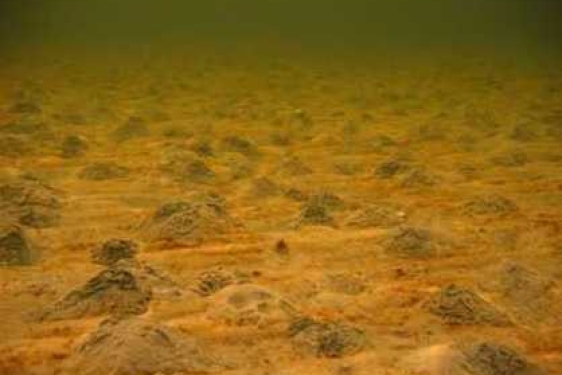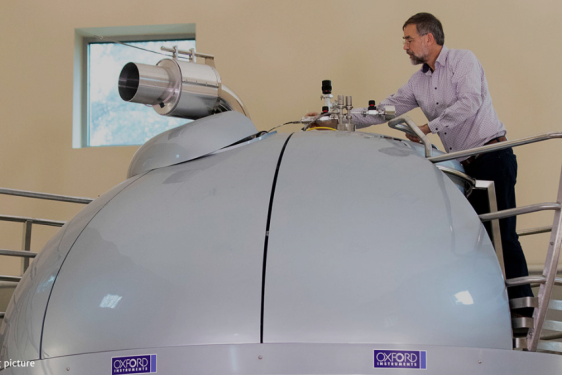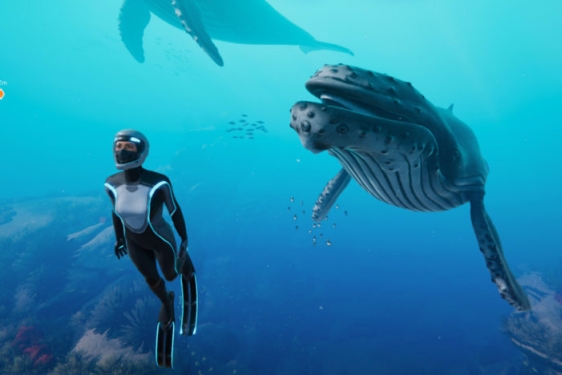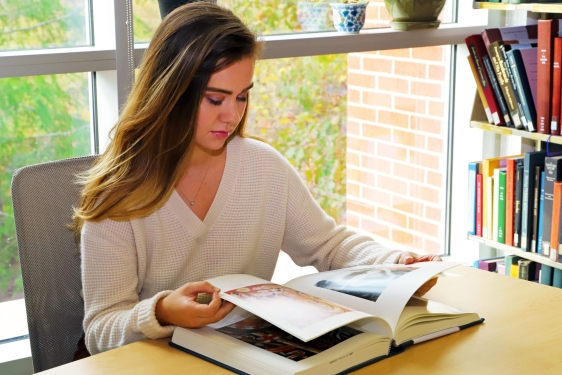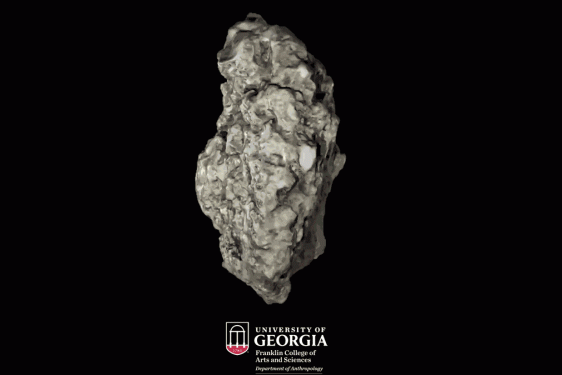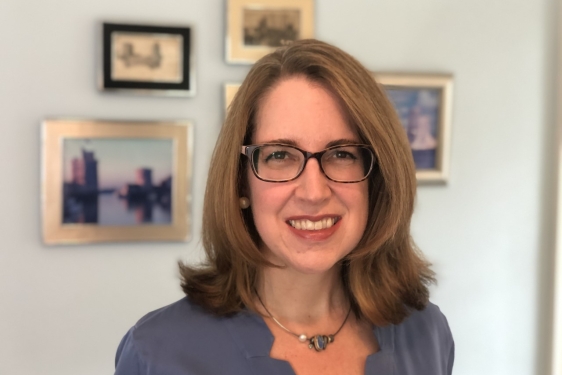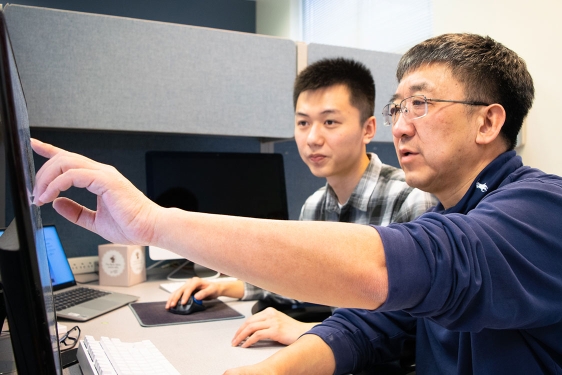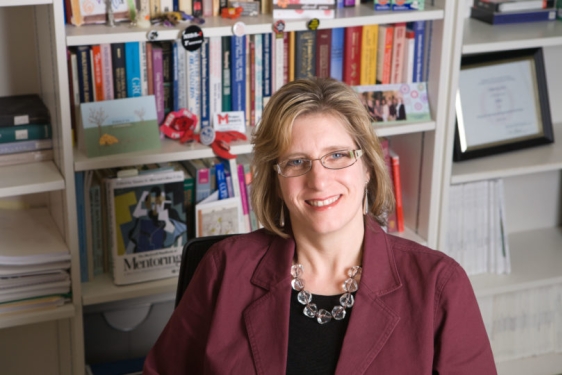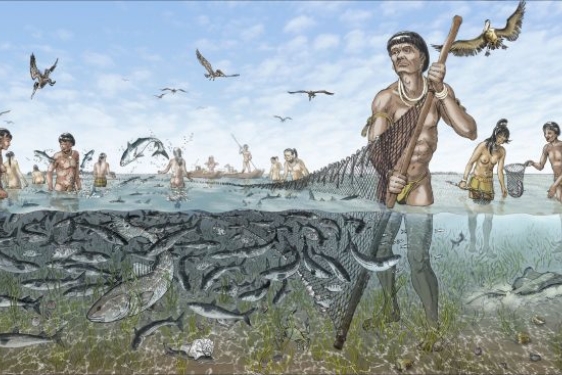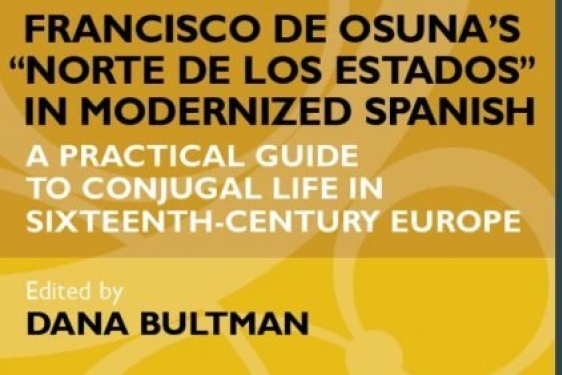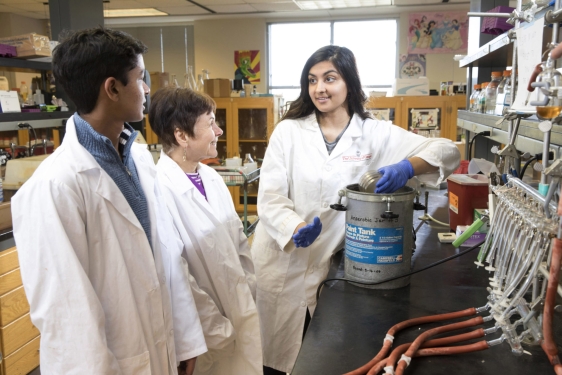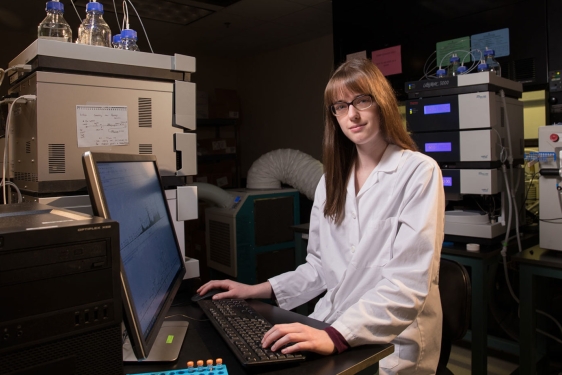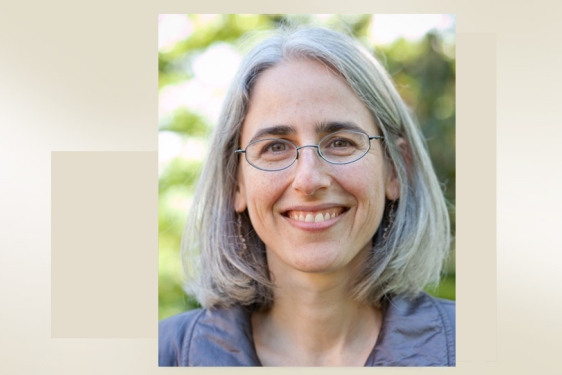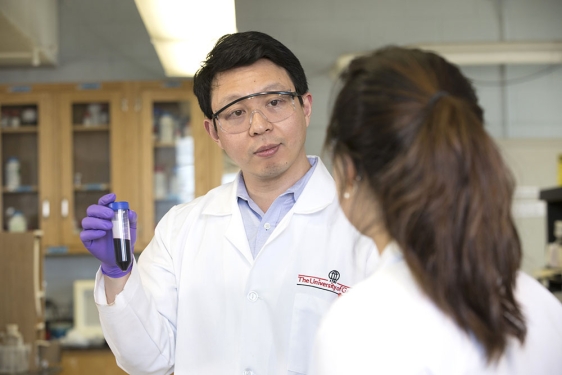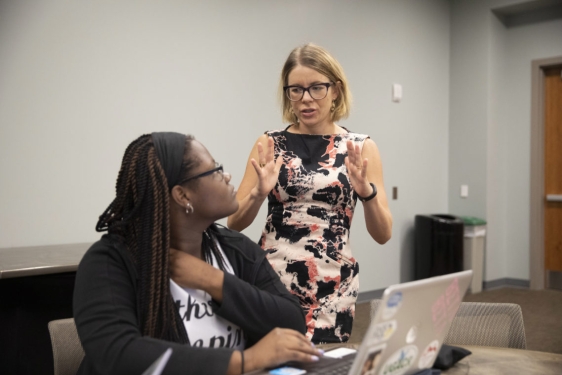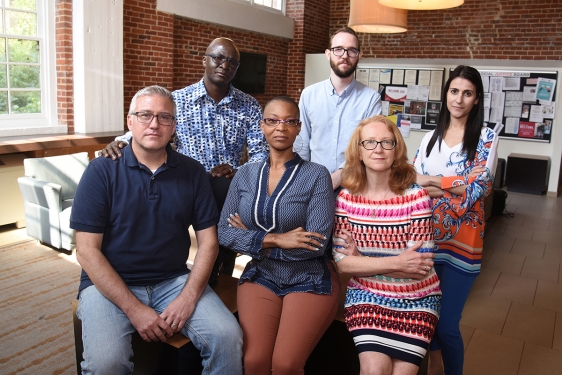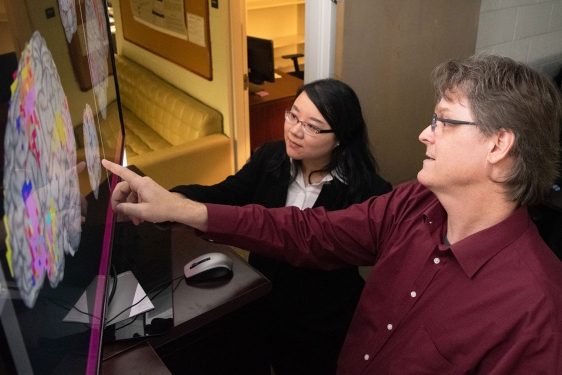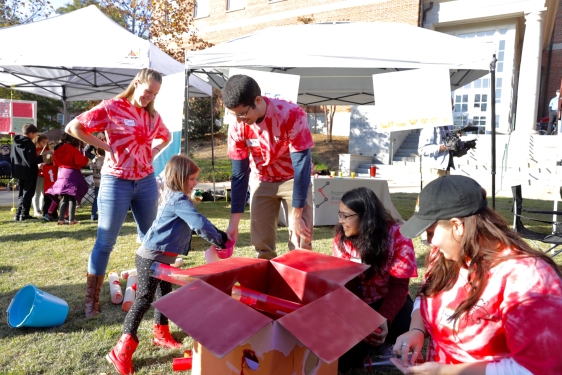Tags: research
Researchers from ETH Zurich and UGA show that the activity of burrowing worms, clams, and shrimp are the most important driver of the community structure of microorganisms in the Earth's biggest carbon sink: continental shelf sediments. The results were published this week in the Proceedings of the National Academy of Sciences:
Sediments underlying the world’s oceans and shelf seas cover >70% of the Earth’s surface area. These…
As part of the CCRC and the department of biochemistry and molecular biology, Art Edison's wide-ranging expertise in metabolomics – used to characterize and identify the molecules that make up an organism, tissues, or cells – is an important resource for faculty collaborations in a range of critical research areas, including COVID-19:
“Metabolites are the things that are responding to what’s going on in a…
In a gaming experience that takes players into the near future to explore the mysteries of the ocean, “Beyond Blue” is a new video game launched by E-Line Media in conjunction with the BBC and the researchers behind its “Blue Planet II” series.
The game allows players to become part of a new research team using groundbreaking technologies to see, hear and interact with the ocean in a meaningful way. University of Georgia Regents’ Professor…
From Zoom meetings to marathon telephone calls, the COVID-19 pandemic and social distancing protocols have effected how workers of every stripe conduct business from home, altering our work environments while we continue our organizations' operations.
The effects of the rapid transition to working remotely is the focus of a new research project in the department of psychology:
There is not a lot of…
Congratulations to two Art History faculty members in the Lamar Dodd School of Art who recently had books published.
Dr. Alisa Luxenberg, Professor of Art History, teaches undergraduate and graduate courses in 18th- and 19th-century European art and the early history of photography. Her recent research has resulted in a volume edited with Reva Wolf: Freemasonry and the Visual Arts from the Eighteenth Century Forward:…
UGA undergraduates, including hundreds of Franklin College majors, shared their research endeavors in a new way this spring during the 2020 Virtual CURO Symposium held April 21-24:
After mentoring from faculty members across various UGA colleges, students shared a total of 580 posters and oral presentations using UGA’s eLearning Commons. Student presenters, faculty members and anyone who requested access were able to…
Archaeologists from UGA and the Florida Museum of Natural History have discovered the location of Fort San Antón de Carlos, home of one of the first Jesuit missions in North America. The Spanish fort was built in 1566 in the capital of the Calusa, the most powerful Native American tribe in the region, on present-day Mound Key in the center of Estero Bay on Florida’s Gulf Coast.
Archaeologists and historians have long suspected…
University of Georgia faculty member Jennifer Palmer has been named a 2020 recipient of an American Council of Learned Societies Fellowship. The ACLS Fellowship program honors scholarship in the humanities and humanistic social sciences with the potential to make significant contributions to knowledge in their fields. The awards range from $40,000 to $75,000 and support six to 12 months of full-time research and writing.
Palmer, associate…
Growing up in a family of scientists had a great effect on Ying Xu’s career. With two chemistry professors for parents, he was exposed to science at a very early age. However, it was his uncle, a computer scientist, who encouraged him to study computer science or mathematics.
Xu obtained his Ph.D. in applied mathematics from the University of Colorado Boulder. During his doctoral studies, Xu knew very little about biology. Learning about…
Lillian Eby, a professor of psychology and director of the University of Georgia Owens Institute for Behavioral Research, has been named UGA’s 2020 recipient of the Southeastern Conference Faculty Achievement Award:
Eby, a professor in the Franklin College of Arts and Sciences, is recognized both nationally and internationally for her impact on the field of industrial-organizational psychology, with particular emphases…
More than 100 international social scientists are working together to collect immediate and longitudinal information on the key social science factors that might predict the spread of COVID-19. The project, known as PsyCorona, will pair social and data scientists to connect data across multiple layers—individual survey reports from 10,000-plus participants from more than nine countries, satellite data documenting social distancing, and…
A new article in Alcohol & Drug Abuse Weekly, from Wiley Online Library, tackles a particularly timely subject: Are people drinking more now that they are locked in a house with their nearest and dearest, facing job loss or having lost a job, bored and stressed? Probably. Is drinking a healthy way of coping? No.
The article includes comments by experts including Paul M. Roman, Professor Emeritus of Sociology, who provided…
New research from anthropology professor Victor Thompson sheds light on innovative hunter-gatherer practices in early Florida:
[The] Calusa ruled South Florida for centuries, wielding military power, trading and collecting tribute along routes that sprawled hundreds of miles, creating shell islands, erecting enormous buildings and dredging canals wider than some highways. Unlike the Aztecs, Maya and Inca, who built their empires…
Best known for his works on the mystical practice of meditative recollection, Franciscan friar Francisco de Osuna published his candid manual for lay life, Norte de los estados (North Star) in 1531 before leaving Spain to reside in Antwerp.
Professor of Spanish Dana Bultman has published the first modern edition in Spanish restores Osuna’s reformist voice and expansive vision to the animated conversations on marriage and…
Janet Westpheling, professor of genetics in the Franklin College of Arts and Sciences department of genetics, has been selected for the Phi Beta Kappa Visiting Scholar Program. Since 1956, the program has been offering undergraduates the opportunity to spend time with some of America’s most distinguished scholars.
Westpheling teaches undergraduate and graduate classes in genetics and trains undergraduates, graduate students and…
Hannah Stephen, a Ph.D. candidate in biochemistry and molecular biology, has received the F30 Ruth L. Kirschstein Individual Fellowship from the National Institutes of Health and the Eunice Kennedy Shriver National Institute of Child Health and Human Development:
“Receiving this fellowship is such an honor and I’m very grateful to the NIH and the NICHD for seeing the importance of my work and the vision of my future work,” said Stephen…
An interdisciplinary team co-led by sociology faculty member Sarah Shannon was awarded a grant by the Vera Institute of Justice to address increasing incarceration rates in rural communities and the impact of jailing people who are mentally ill or substance abusers:
The $235,000 grant will allow faculty from the Carl Vinson Institute of Government, Franklin College of Arts and Sciences and the School of Social Work to develop a “…
Franklin faculty provided expert commentary and analysis as well as important new research in a strong start to 2020. Here are a few of the top stories so far this year:
Voting rights restoration gives felons a voice in more states – associate professor sociology Sarah Shannon quoted by PEW, St. Louis Post-Dispatch, The Crime Report, KyForward
Five social media posts about weather that need to go…
The National Endowment for the Humanities has awarded a research fellowship to Rachel Gabara, associate professor in the University of Georgia Franklin College of Arts and Sciences’ department of Romance languages, funded as a part of more than $30 million in new NEH grants for 188 humanities projects nationwide.
The fellowship will fund the completion of Gabara’s second book manuscript. The project, “Reclaiming Realism: From Documentary…
A new study at the University of Georgia describes a way to attack cancer cells that is potentially less harmful to the patient. Sodium chloride nanoparticles – more commonly known as salt – are toxic to cancer cells and offer the potential for therapies that have fewer negative side effects than current treatments.
Led by Jin Xie, associate professor of chemistry, the study found that SCNPs can be used to deliver ions into cells and…
An extraordinary scholar of history and Latin American and Caribbean Studies, assistant professor Cassia Roth brings humility and a passion for scholarship into the classroom:
My work looks at the intersection of medicine and law in women’s reproductive lives. My forthcoming book, “A Miscarriage of Justice: Women’s Reproductive Lives and the Law in Early Twentieth-Century Brazil” (Stanford University Press, 2020),…
Human trafficking involves recruitment, harboring or transporting people into a situation of exploitation through the use of violence, deception or coercion and forcing victims to work against their will. A process of enslavement, trafficking affects millions of men, women, and children – including in the United States. It can happen in any community and victims can be any age, race, gender, or nationality, and now…
Jiaying Liu and Lawrence Sweet are working to produce scientific data to inform the public about vaping products and to guide efforts toward enacting bans on flavored products:
Liu, assistant professor of communication studies, and Sweet, professor of psychology and director of the Clinical Neuroscience Laboratory, have teamed up to investigate vaping among young adults. Liu secured internal grant funding through the Office…
Students and faculty from anthropology, genetics, marine sciences and cellular biology offered up-close interaction with UGA research to young fans attending the UGA-Missouri game this past Saturday:
STEMzone, now in its third year, hosted more than a dozen hands-on opportunities to engage people of all ages on research being done at UGA in the science, technology, engineering and math fields.
“We are glad to report that STEMzone fall…
The University of Georgia has awarded a grant to a 22-member UGA academic team to study the history of slavery at UGA from the institution’s founding in 1785 until the end of the Civil War in 1865.
The research team—which spans multiple schools, colleges and other units across the university—will conduct a multidisciplinary study of enslaved African Americans who labored on the UGA campus. In September, the team submitted a proposal, which was…

